Unit 4 Making the news Extensive Reading课件(30张)
文档属性
| 名称 | Unit 4 Making the news Extensive Reading课件(30张) |

|
|
| 格式 | zip | ||
| 文件大小 | 456.5KB | ||
| 资源类型 | 教案 | ||
| 版本资源 | 人教版(新课程标准) | ||
| 科目 | 英语 | ||
| 更新时间 | 2018-07-19 00:00:00 | ||
图片预览

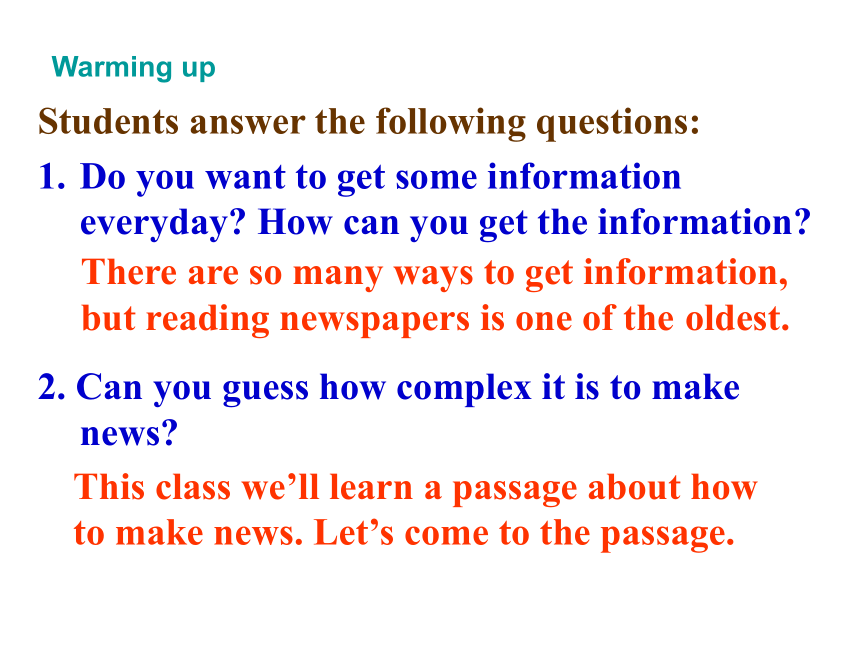
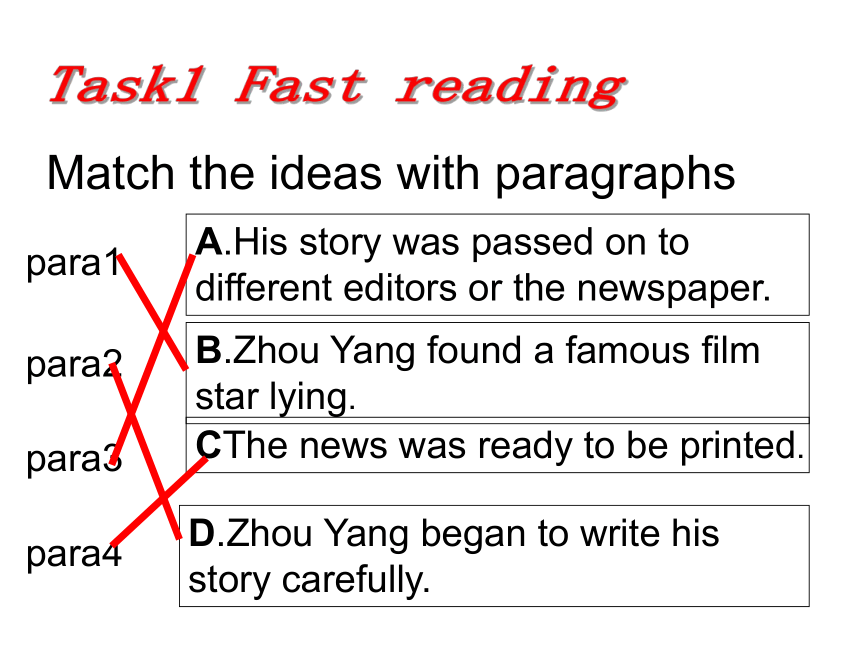
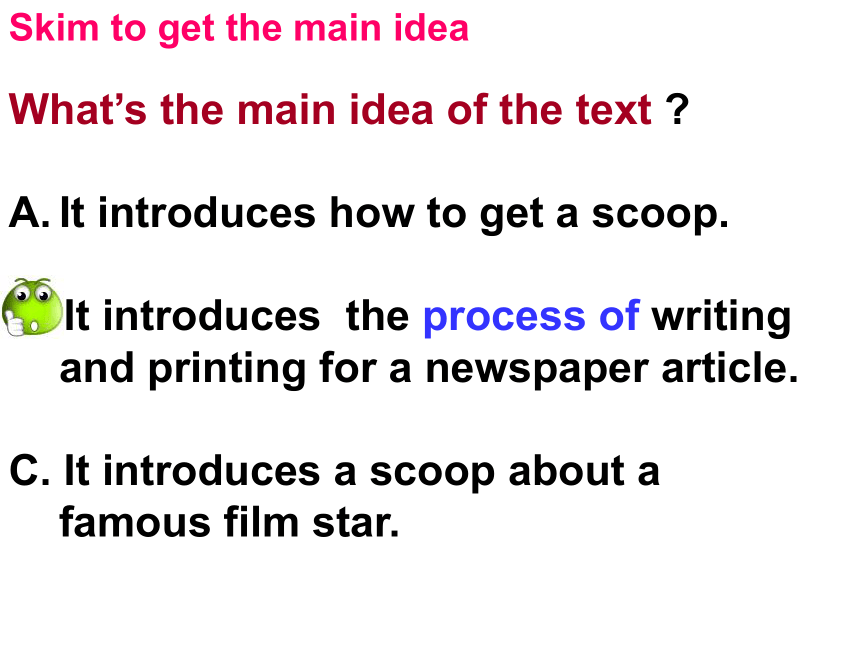
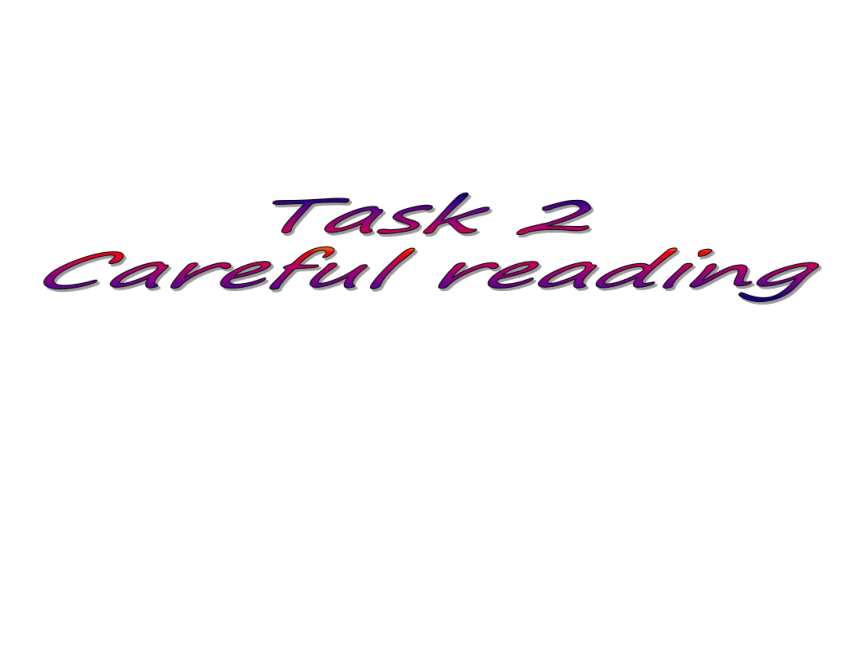
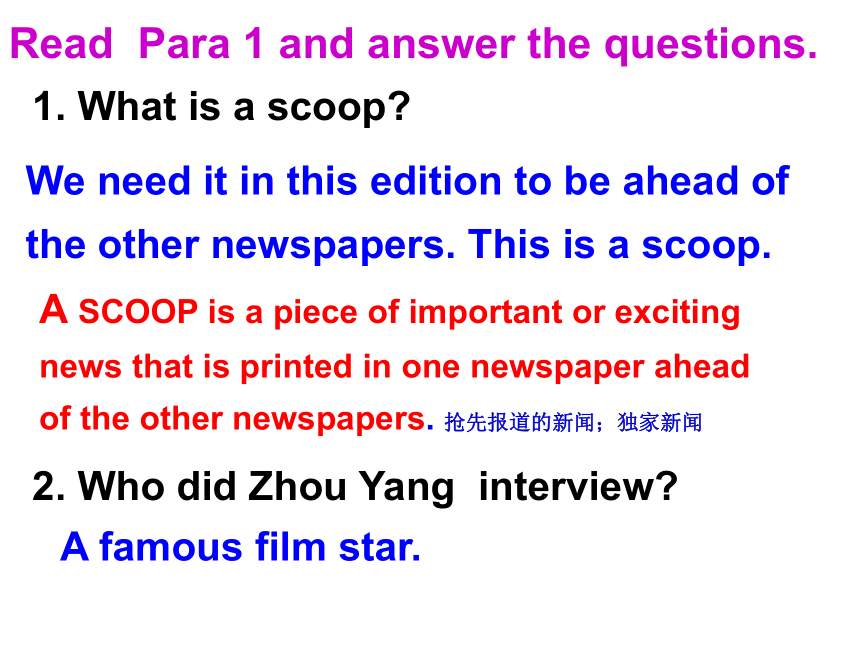
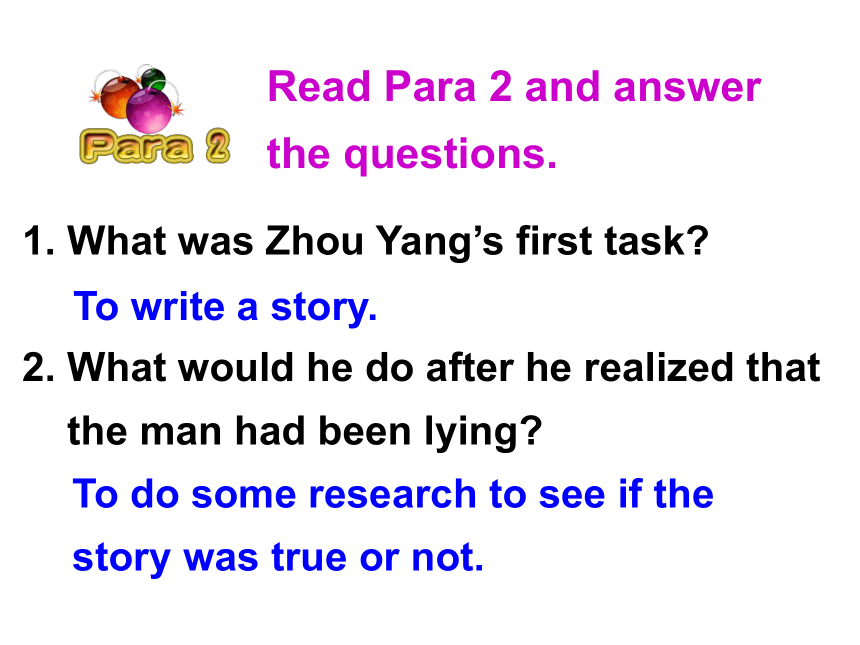
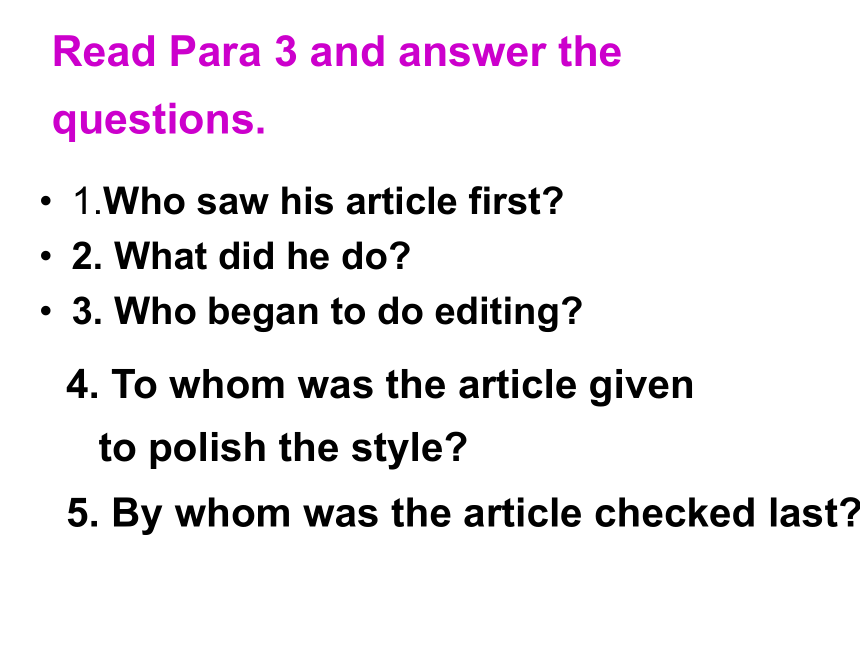
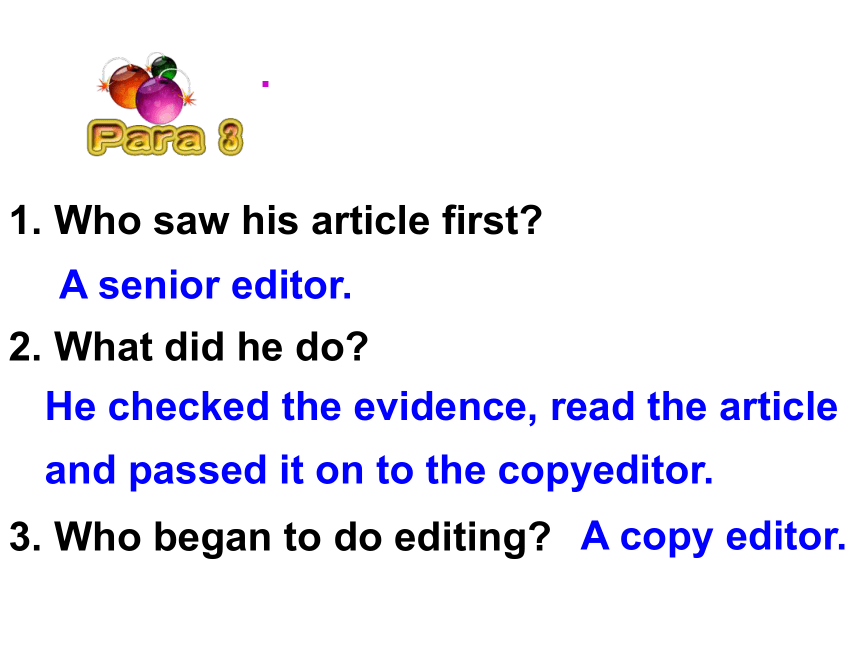
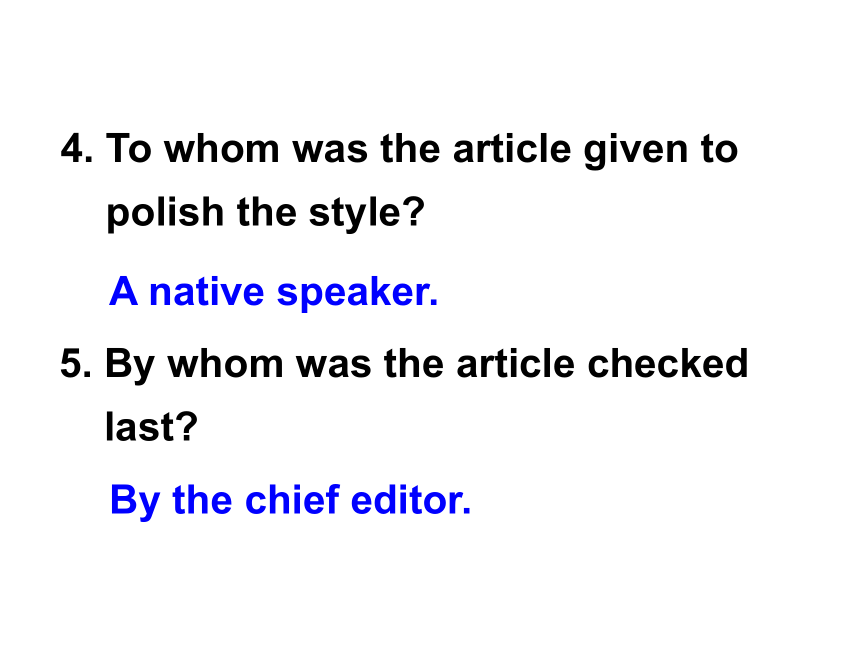
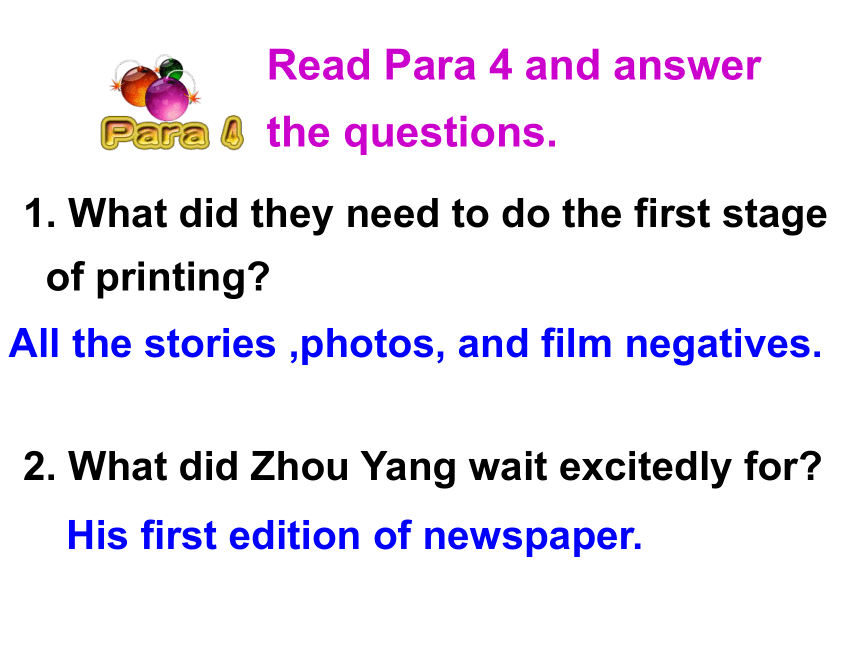
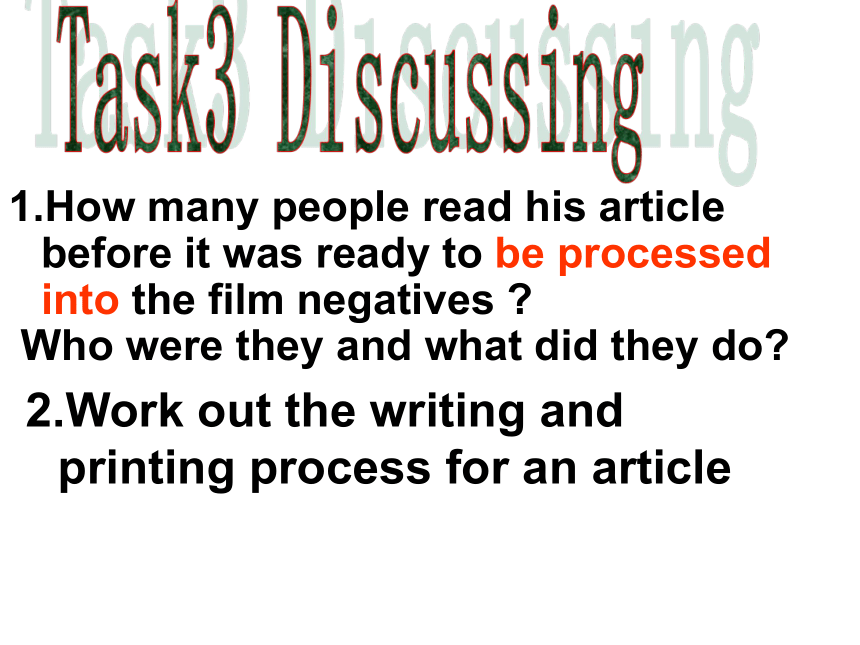
文档简介
课件30张PPT。Extensive Reading Getting the ScoopWarming upStudents answer the following questions:
Do you want to get some information everyday? How can you get the information?
2. Can you guess how complex it is to make news?There are so many ways to get information, but reading newspapers is one of the oldest. This class we’ll learn a passage about how to make news. Let’s come to the passage.Task1 Fast readingMatch the ideas with paragraphspara1para2para3para4A.His story was passed on to different editors or the newspaper.B.Zhou Yang found a famous film star lying.CThe news was ready to be printed.D.Zhou Yang began to write his story carefully.Skim to get the main idea What’s the main idea of the text ?
It introduces how to get a scoop.
B. It introduces the process of writing and printing for a newspaper article.
C. It introduces a scoop about a famous film star.
Task 2
Careful readingRead Para 1 and answer the questions.1. What is a scoop?
2. Who did Zhou Yang interview?We need it in this edition to be ahead of the other newspapers. This is a scoop.A SCOOP is a piece of important or exciting news that is printed in one newspaper ahead of the other newspapers. 抢先报道的新闻;独家新闻
A famous film star.Read Para 2 and answer the questions. What was Zhou Yang’s first task?
2. What would he do after he realized that
the man had been lying?To write a story.To do some research to see if the
story was true or not.Read Para 3 and answer the questions.1.Who saw his article first?
2. What did he do?
3. Who began to do editing?4. To whom was the article given to polish the style?5. By whom was the article checked last?. Who saw his article first?
2. What did he do?
3. Who began to do editing?A senior editor.He checked the evidence, read the article and passed it on to the copyeditor.A copy editor.5. By whom was the article checked
last?By the chief editor.4. To whom was the article given to
polish the style?A native speaker.Read Para 4 and answer the questions. What did they need to do the first stage
of printing?
2. What did Zhou Yang wait excitedly for?All the stories ,photos, and film negatives.His first edition of newspaper.Task3 Discussing1.How many people read his article before it was ready to be processed into the film negatives ?
Who were they and what did they do?
2.Work out the writing and printing process for an article a senior editor from his departmentcopy-editor native speaker chief editornews desk
editor check edit;design polish approve1. You go to an interview to _________________for your story.2. You ________________to see if the story is true or not.3. You begin to _______ the story using notes from the interview.4. You give the article to the copy-editor to_______.get the informationdo some researchwritedesign5. The article is given to a native speaker to __________________7. All the stories and photos are set and ________
_________ for the printing are made ready.8. The first edition of a news paper is________.polish the stylechecked /approved color negatives6. The last stage the article is _________________by the chief editor. printedLanguage Points1. edition 版本,书报等一次发行总数
<归纳拓展>
editor n. 编辑
edit v. 编辑, 剪辑
edit sth. out of (sth.) 删除2. accurate adj.正确无误的,精确的,准确的
<归纳拓展>
accuracy n. 准确, 精确
precise adj. 精确的, 独特的, 精细的
exact adj. 正确的, 准确的, 严谨的, 精密的
accurately adv. 精确, 准确
correct adj. 正确的, 准确1) ________ statistics, measurements, calculations, are very important.
2) It’s impossible to say with any ________ how many are affected.
3) This is the ______ dress for a formal dinner.
4) The ____ time is three minutes and thirty-five seconds.Accuratecorrectaccuracyexact5) They both came here at ______ the same time.
6) He is ______ in everything.
7) The diagram had been copied with great ________.
8) He is a man with a ______ mind.precisepreciseexactlyprecision3. senior adj. 年长的, (级别、职位、
资格)较高的, 高年级的(作定语)
senior n. 年较长的人, 毕业班或高年
级的学生
junior adj. 较幼的, 较小的
superior adj. 较高的, 优越的, 优良的,
不屈服的注意:本身都是比较级形式,无须再添加 more 或-er; 这三个词用于比较级中不与 than 连用,而与 to 连用。1) He is not superior to temptation. 他经不住诱惑。
2) This engine is superior in many aspects. 这台发动机在很多方面性能都非常优越。3) He is two years senior to me. 他比我大两岁。
4) I will have to ask my superior. 那事我得先问一下我们公司老板。
5) He is wearing a superior smile. 他脸上带有高傲的微笑。4. approve v. 赞成,认可,满意,批准,通过
approval n. 赞成、同意、认可
approving adj. 赞许的、认可的You can join the class if your mother approves.
你可以参加这个班, 如果你母亲同意的话。
2) You made a good decision, and I thoroughly approve it.
你作出了一个好决定, 我不折不扣(衷心)地表示赞同。
3) I don’t approve of smoking in bed.
我不赞成躺在床上吸烟。
4) She received many approving glances.
她赢得了很多赞许的目光。5. appointment n. 任命, 委派, 工作, 职位, 约会, 预约
appoint v. 任命, 委派确定或决定某事物
appoint that sth. (shall be done)命令某事
take an appointment 就职
by appointment 按照约定
keep/ break ones appointment 守/违约
make/ fix an appointment with与某人约会6. When do you think is convenient for you?
句中do you think 作插入语,英语中do you think / suppose / believe/ imagine 等和疑问代词或疑问副词连用时, 常把疑问代(副)词置于句首, 而把do you think置于句中。提示: do you think 置于句中,句子的语序应该为正常语序, 不再使用倒装语序; 这类结构也可以用于定语从句里作为插入语。 What do you think _______?
A. is he interested in B. interested he
C. he is interested in D. does he interest
(2) Who do you think _____?
A. broke the window
B. of breaking the window
C. to break the window
D. did he break the windowI. 用括号内所给词的适当形式填空。
The textbook was first published in 2004 and is now in its second ______ (edit).
2. You should phone his secretary if you want to make an ___________ (appoint).editionappointmentPracticeII. 翻译。
1. 我们的老师强调我们应该注意书写。(note)
2. 我父亲赞成我去西部。(approve of)
Our teacher noted that we should pay attention to our handwriting.My father approved of my going to the west.3. 必须保存准确的记录。(accurate)
Accurate records must be kept.III. 汉译英或英译汉。
主编
2. 独家新闻
3. 新闻文字编辑
4. 新闻编辑部chief editor scoopnews desk editorNews Department5. front page article
6. main heading
7. film negatives
8. copy-editor技术编辑头版新闻主标题胶片Homework1. Read the text on P 65
2. Study the new words.
Do you want to get some information everyday? How can you get the information?
2. Can you guess how complex it is to make news?There are so many ways to get information, but reading newspapers is one of the oldest. This class we’ll learn a passage about how to make news. Let’s come to the passage.Task1 Fast readingMatch the ideas with paragraphspara1para2para3para4A.His story was passed on to different editors or the newspaper.B.Zhou Yang found a famous film star lying.CThe news was ready to be printed.D.Zhou Yang began to write his story carefully.Skim to get the main idea What’s the main idea of the text ?
It introduces how to get a scoop.
B. It introduces the process of writing and printing for a newspaper article.
C. It introduces a scoop about a famous film star.
Task 2
Careful readingRead Para 1 and answer the questions.1. What is a scoop?
2. Who did Zhou Yang interview?We need it in this edition to be ahead of the other newspapers. This is a scoop.A SCOOP is a piece of important or exciting news that is printed in one newspaper ahead of the other newspapers. 抢先报道的新闻;独家新闻
A famous film star.Read Para 2 and answer the questions. What was Zhou Yang’s first task?
2. What would he do after he realized that
the man had been lying?To write a story.To do some research to see if the
story was true or not.Read Para 3 and answer the questions.1.Who saw his article first?
2. What did he do?
3. Who began to do editing?4. To whom was the article given to polish the style?5. By whom was the article checked last?. Who saw his article first?
2. What did he do?
3. Who began to do editing?A senior editor.He checked the evidence, read the article and passed it on to the copyeditor.A copy editor.5. By whom was the article checked
last?By the chief editor.4. To whom was the article given to
polish the style?A native speaker.Read Para 4 and answer the questions. What did they need to do the first stage
of printing?
2. What did Zhou Yang wait excitedly for?All the stories ,photos, and film negatives.His first edition of newspaper.Task3 Discussing1.How many people read his article before it was ready to be processed into the film negatives ?
Who were they and what did they do?
2.Work out the writing and printing process for an article a senior editor from his departmentcopy-editor native speaker chief editornews desk
editor check edit;design polish approve1. You go to an interview to _________________for your story.2. You ________________to see if the story is true or not.3. You begin to _______ the story using notes from the interview.4. You give the article to the copy-editor to_______.get the informationdo some researchwritedesign5. The article is given to a native speaker to __________________7. All the stories and photos are set and ________
_________ for the printing are made ready.8. The first edition of a news paper is________.polish the stylechecked /approved color negatives6. The last stage the article is _________________by the chief editor. printedLanguage Points1. edition 版本,书报等一次发行总数
<归纳拓展>
editor n. 编辑
edit v. 编辑, 剪辑
edit sth. out of (sth.) 删除2. accurate adj.正确无误的,精确的,准确的
<归纳拓展>
accuracy n. 准确, 精确
precise adj. 精确的, 独特的, 精细的
exact adj. 正确的, 准确的, 严谨的, 精密的
accurately adv. 精确, 准确
correct adj. 正确的, 准确1) ________ statistics, measurements, calculations, are very important.
2) It’s impossible to say with any ________ how many are affected.
3) This is the ______ dress for a formal dinner.
4) The ____ time is three minutes and thirty-five seconds.Accuratecorrectaccuracyexact5) They both came here at ______ the same time.
6) He is ______ in everything.
7) The diagram had been copied with great ________.
8) He is a man with a ______ mind.precisepreciseexactlyprecision3. senior adj. 年长的, (级别、职位、
资格)较高的, 高年级的(作定语)
senior n. 年较长的人, 毕业班或高年
级的学生
junior adj. 较幼的, 较小的
superior adj. 较高的, 优越的, 优良的,
不屈服的注意:本身都是比较级形式,无须再添加 more 或-er; 这三个词用于比较级中不与 than 连用,而与 to 连用。1) He is not superior to temptation. 他经不住诱惑。
2) This engine is superior in many aspects. 这台发动机在很多方面性能都非常优越。3) He is two years senior to me. 他比我大两岁。
4) I will have to ask my superior. 那事我得先问一下我们公司老板。
5) He is wearing a superior smile. 他脸上带有高傲的微笑。4. approve v. 赞成,认可,满意,批准,通过
approval n. 赞成、同意、认可
approving adj. 赞许的、认可的You can join the class if your mother approves.
你可以参加这个班, 如果你母亲同意的话。
2) You made a good decision, and I thoroughly approve it.
你作出了一个好决定, 我不折不扣(衷心)地表示赞同。
3) I don’t approve of smoking in bed.
我不赞成躺在床上吸烟。
4) She received many approving glances.
她赢得了很多赞许的目光。5. appointment n. 任命, 委派, 工作, 职位, 约会, 预约
appoint v. 任命, 委派确定或决定某事物
appoint that sth. (shall be done)命令某事
take an appointment 就职
by appointment 按照约定
keep/ break ones appointment 守/违约
make/ fix an appointment with与某人约会6. When do you think is convenient for you?
句中do you think 作插入语,英语中do you think / suppose / believe/ imagine 等和疑问代词或疑问副词连用时, 常把疑问代(副)词置于句首, 而把do you think置于句中。提示: do you think 置于句中,句子的语序应该为正常语序, 不再使用倒装语序; 这类结构也可以用于定语从句里作为插入语。 What do you think _______?
A. is he interested in B. interested he
C. he is interested in D. does he interest
(2) Who do you think _____?
A. broke the window
B. of breaking the window
C. to break the window
D. did he break the windowI. 用括号内所给词的适当形式填空。
The textbook was first published in 2004 and is now in its second ______ (edit).
2. You should phone his secretary if you want to make an ___________ (appoint).editionappointmentPracticeII. 翻译。
1. 我们的老师强调我们应该注意书写。(note)
2. 我父亲赞成我去西部。(approve of)
Our teacher noted that we should pay attention to our handwriting.My father approved of my going to the west.3. 必须保存准确的记录。(accurate)
Accurate records must be kept.III. 汉译英或英译汉。
主编
2. 独家新闻
3. 新闻文字编辑
4. 新闻编辑部chief editor scoopnews desk editorNews Department5. front page article
6. main heading
7. film negatives
8. copy-editor技术编辑头版新闻主标题胶片Homework1. Read the text on P 65
2. Study the new words.
